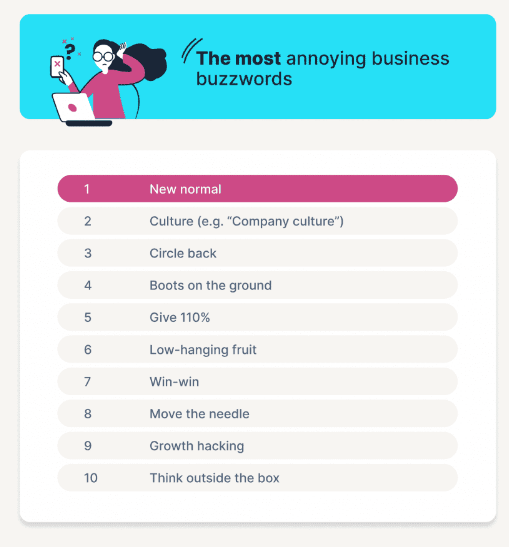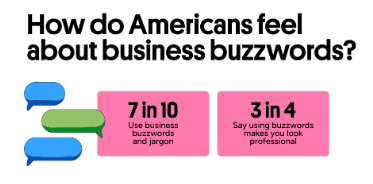Hiring professionals to help with marketing is a smart move. Occasionally, marketers throw around too many big words and technical-sounding buzzwords, but it does not mean anything to regular folks. If your customers can not understand you, they will not trust your business or purchase from you.
To make sure your marketing is effective and easy to understand, stay away from these buzzwords and jargon that are trendy now.
1. Disruption and Disruptor
You have probably heard companies say they are going to “disrupt the industry.” It sounds exciting, but what does it really mean?
- What it actually means: Changing the way things are usually done.
- Why you should avoid it: Most people do not want their lives “disrupted.” They want solutions, not confusion.
- What to say instead:
- “We are improving the way things work.”
- “Our product makes things easier for you.”
Disruption is not always a good thing. Focus on how your product helps people instead of just saying you are “shaking things up.”
2. Pivot to Video
Some marketers will tell you that you must “pivot to video” (switch from text to videos) on social media. They claim people do not read anymore and that videos get more attention.
- The truth: Videos can work, but not everyone likes watching them. Some people prefer reading.
- Why you should avoid this phrase: It is overused, and not every business needs to rely on videos.
- What to do instead:
- Use a mix of videos, images, and text.
- Test what works best for your audience instead of blindly following trends.
3. Thought Leadership
Companies love calling themselves “thought leaders.” But what does that even mean?
- What it actually means: Being seen as an expert in your field.
- Why you should avoid it: It sounds arrogant and vague. Most people do not care about “thought leaders”—they care about useful information.
- What to say instead:
- “We share expert advice on [topic].”
- “Here is what we have learned from years of experience.”
4. Synergy
This word is used when companies work together, but it becomes meaningless.
- Example: “Our synergy with partners creates better solutions.”
- Why it is bad: Nobody talks like this in real life. It sounds fake.
- What to say instead:
- “We work well with others to get great results.”
- “Our team collaborates to solve problems.”
5. Leverage (When You Mean “Use”)
Marketers love saying “leverage” instead of “use.”
- Example: “We leverage technology to drive growth.”
- Why it is bad: It is unnecessary. Just say “use.”
- What to say instead:
- “We use technology to grow our business.”
6. Next-Gen or Cutting-Edge
Calling something next-gen or cutting-edge does not explain why it is better.
- Example: “Our cutting-edge software changes the game.”
- What to say instead:
- “Our software loads 50% faster than competitors.”
- “This tool saves you 3 hours per week.”
7. Game-Changer
If everything is a game-changer, then nothing really is.
- Example: “Our new app is a total game-changer!”
- Why it is overused: People hear this all the time and do not believe it.
- What to say instead:
- “Our app helps you finish tasks in half the time.”
8. Holistic Approach
This phrase is used to sound smart, but it is confusing.
- Example: “We take a holistic approach to marketing.”
- What it actually means: Looking at the big picture.
- What to say instead:
- “We look at all parts of your business to find the best solution.”
9. Low-Hanging Fruit
This means going after the easiest opportunities first.
- Example: “Let us target the low-hanging fruit in our sales strategy.”
- Why it is bad: It is a cliché and sounds lazy.
- What to say instead:
- “Let us start with the easiest wins first.”
10. Boil the Ocean
This means trying to do something impossible.
- Example: “We do not want to boil the ocean with this project.”
- Why it is bad: Most people have no idea what this means.
- What to say instead:
- “Let us focus on what is realistic.”
11. Actionable Insights
Insights are useful, so there is no need to call them “actionable.” Instead of saying this, offer plain, simple advice that your readers can implement.
12. Scalable
“Scaled” is occasionally used to describe businesses or solutions that have the ability to grow without diminishing performance. Without context, however, it is not very descriptive. Instead, explain to readers how your solution will be able to satisfy increased demand or growth.
13. Paradigm Shift
A “paradigm shift” is a complete change in methodology or assumptions. If your product or service is not changed enough to create one, it is better to describe it in a more specific language.
14. Bleeding Edge
Like “cutting-edge,” but implying that something is so new that it has not been tried and might be risky, instead of saying this, stress the proven advantages and features of your product.
15. Unprecedented
“Unprecedented” is a term used to describe something that has never occurred before. However, it is primarily used excessively, so it loses its value. Instead, provide specific examples to describe the way something is new or original.
16. Circle Back
- What it means: To revisit a topic later.
- Why avoid it? It sounds like you are avoiding the issue now.
- Say instead: “Let us talk about this again next week.”
17. Move the Needle
- What it means: Making progress.
- Why avoid it? It is vague—how much progress?
- Say instead: “This strategy will help us grow sales by 20%.”
18. Best-in-Class
- What it means: Supposedly the best.
- Why avoid it? Everyone claims this—prove it instead.
- Say instead: “Our product has the highest customer satisfaction rating.”
19. Deep Dive
- What it means: Looking closely at something.
- Why avoid it? It is overused and sounds dramatic.
- Say instead: “We will review the details.”
20. Win-Win
- What it means: A deal where both sides benefit.
- Why avoid it? It is a cliché—explain how it helps.
- Say instead: “This plan benefits both of us by…”
Why Simple Words Work Better
- People trust what they understand. If your message is clear, customers feel confident.
- Buzzwords make you sound like everyone else. Stand out by speaking like a real person.
- Concrete details sell. Instead of saying “innovative solution,” say, “Our app cuts your work time in half.”
How to Check Your Marketing for Jargon
- Read it out loud. If it sounds unnatural, rewrite it.
- Ask a friend outside your industry. If they do not get it, your customers might not either.
- Focus on benefits, not buzzwords. Explain how your product helps, not just what it is.

Why Avoiding Buzzwords Matters
- Customers believe in honesty and engaging content. If you sound fake, people will not pay attention to you.
- Simple words work better. You do not have to use complex jargon to sound professional.
- Your argument comes through. When you lay it out in plain language, people understand and remember.
How to Write Better Marketing Copy
- Be specific. Do not say “dramatic results.” Say, “saves you 10 hours a week.”
- Try it out. Have someone outside your industry read it and see if they understand it.
Conclusion
While buzzwords sound fantastic, they do not take you far toward making your message more valuable and could even confuse and deter your readers. Talking in understandable, concrete, and significant words, you will be heard louder and mean more to your readers. Remember, it is not about impressing but about being heard and providing value.

